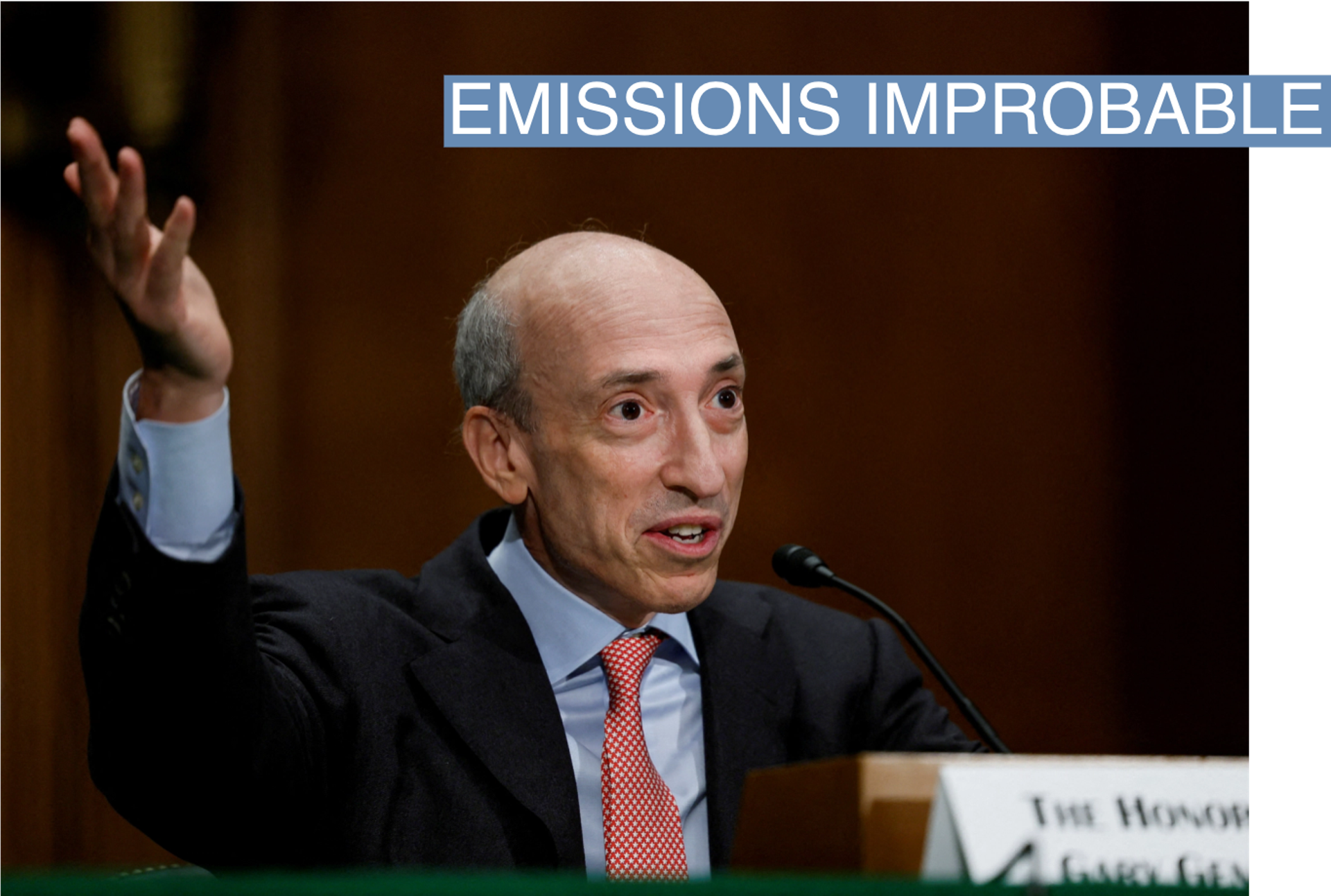The Scoop
The SEC is considering dropping the most controversial provision on carbon emissions from its much-anticipated rule on corporate climate disclosures, according to people familiar with the matter.
Known as “Scope 3” emissions because they go well beyond the greenhouse gasses generated by a corporation’s core operations, the measure would require public companies to account for carbon emanating from their entire supply chains and loan portfolios.
It’s the most hotly debated piece of SEC Chair Gary Gensler’s push to force more disclosure from listed companies. Business leaders have howled that the paperwork and cost would be prohibitive, while progressives in Gensler’s own party see it as key to confronting climate change.
Current drafts of the rule, which could be finalized as soon as next month, do not include requirements on Scope 3 emissions, the people said. They may yet be added, but staffers have also discussed crafting them in such a way that in the inevitable legal challenges, they could be neatly hived off so the rest of the rule remains intact. The measure hasn’t been finalized and could still change. The SEC declined to comment.
Legal superstars Paul Clement and Chuck Cooper are among those actively hunting for plaintiffs, and the Chamber of Commerce has hired Eugene Scalia, the deceased Supreme Court justice’s son and a top regulatory lawyer, to advise it on options, according to people familiar with the matter.
Gensler had originally hoped to release the rule before the midterms, some of the people said, but a technical foot-fault forced them to reopen the period for public comments through Nov. 1. That will likely push finalization of the rule past the election.
Liz’s view
More disclosure solves little here. Investors have been swimming in the stuff in recent years. The average annual financial report has ballooned from 15,000 words in 1997 to more than 40,000 words. And much of that verbiage is boilerplate, added by lawyers trying to protect against the you-never-told-us-this-could-happen lawsuits from shareholders.

This trend has been studied exhaustively and there is little evidence that investors are better informed. Plus, the continued rise of passive funds and retail’s re-emergence as a market force leaves fewer investors who actually read them. Climate change is a problem, but the odds of it being solved – or even meaningfully blunted – by longer annual reports are slim.
Plus, Scope 3 rules were almost certain to be challenged in federal court, and the legal outlook for Gensler was iffy at best. A Supreme Court decision earlier this year that the EPA had overstepped its constitutional bounds in trying to regulate emissions declared open season on federal agencies, whose expanding role in recent decades smacks of regulatory creep to conservatives. Treading lightly here heads off a court ruling that might have defanged the SEC’s ability to ever try to regulate anything beyond basic financial information.
But the politics here are tricky for Gensler, who may now be looking for a way out that won’t get him vilified by progressives. Perhaps limiting the Scope 3 disclosures only to companies in certain industries, like the rule requiring mining companies to certify that their minerals don’t come from certain countries that use those products to finance conflicts. About 1,000 companies a year file those disclosures, according to the GAO. That’s about a quarter of listed U.S. companies.
Room for Disagreement
Todd Phillips, from the left-leaning Center for American Progress, doesn’t buy the idea the rule would be DOA in the courts. He wrote in July op-ed that the SEC is merely “relying on long-standing interpretations of statutes authorizing it to require [companies] to disclose information that is helpful to investors — just as Congress intended.” (Phillips forwarded that op-ed to Gensler’s office.)
The View From London
This spring, Britain became the first G20 country to require companies to disclose their climate-related risks to investors. The U.K. regulations aren’t as prescriptive or detailed as Washington’s but seem to have gone down among the FTSE crowd without too much fuss.
A KPMG vice chair, speaking to the Financial Times, called the rules a “much needed step” but also said they “must go hand in hand with a shift to more digestible financial statements which set out how a company has performed and why.”
Notable
- Gensler has been proposing new rules at a clip: 26 in the first eight months of 2022, twice as many as in all of last year. But the pace is straining the agency’s staff, and turnover is at a 10-year high, according to a report yesterday from the agency’s inspector general.
- Reuters on how climate disclosures, if they are ever implemented, might work their way into CEO bonus calculations. What you don’t measure, you can’t reward.